六年级英语下册第二单元
- 格式:doc
- 大小:25.00 KB
- 文档页数:2
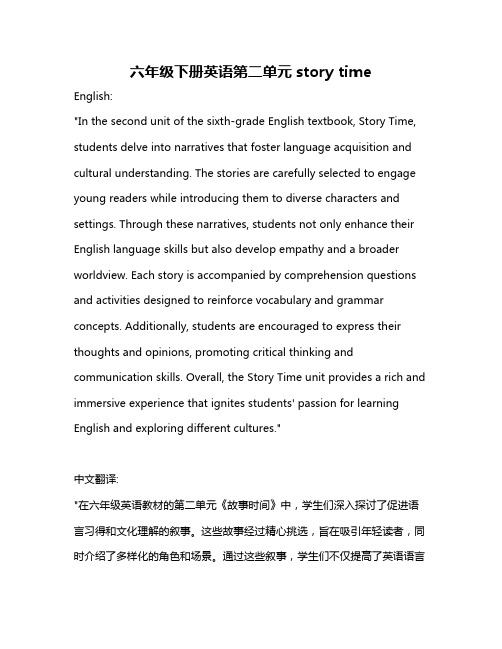
六年级下册英语第二单元story time English:"In the second unit of the sixth-grade English textbook, Story Time, students delve into narratives that foster language acquisition and cultural understanding. The stories are carefully selected to engage young readers while introducing them to diverse characters and settings. Through these narratives, students not only enhance their English language skills but also develop empathy and a broader worldview. Each story is accompanied by comprehension questions and activities designed to reinforce vocabulary and grammar concepts. Additionally, students are encouraged to express their thoughts and opinions, promoting critical thinking and communication skills. Overall, the Story Time unit provides a rich and immersive experience that ignites students' passion for learning English and exploring different cultures."中文翻译:"在六年级英语教材的第二单元《故事时间》中,学生们深入探讨了促进语言习得和文化理解的叙事。


六年级英语下册第⼆单元测试题及答案 掌握好六年级英语第⼆单元试卷的知识点是很重要的,多做英语单元试卷有助于提⾼六年级英语的学习成绩。
以下是⼩编给你推荐的六年级英语下册第⼆单元测试题及参考答案,希望对你有帮助! 六年级英语下册第⼆单元测试题 Part I Listening 第⼀部分听⼒ 共四⼤题 ⼀、 Listen and choose.(听录⾳,选出你所听到的单词。
)(8分) ( ) 1. A. think B. thin C. thing ( ) 2. A. cold B. cool C. cloud ( ) 3. A. matter B. mother C. meter ( ) 4. A. head B. hand C. hear ( ) 5. A. sore B. short C. small ( ) 6. A. fever B. feel C. few ( ) 7. A. tail B. test C. tall ( ) 8. A. study B. sick C. stay ⼆、 Listen and tick or cross.(听录⾳,判断正(T)误(F))。
(12分) 三、Listen and choose(听问句选择答句。
)(10分) x k b 1. c o m ( ) 1. A. I feel sad. B. She's angry. C. It's blue. ( ) 2. A. It's 60m. B. I'm 162cm. C. I'm 62kg. ( ) 3. A. OK B. Not at all. C. Welcome. ( ) 4. A. I'm happy. B. He's tired. C. I have an earache. ( ) 5. A. I feel better. B. I'm feeling happy. C. She's sick. 四、Listen and fill in the blanks.(听⾳,补全句⼦。
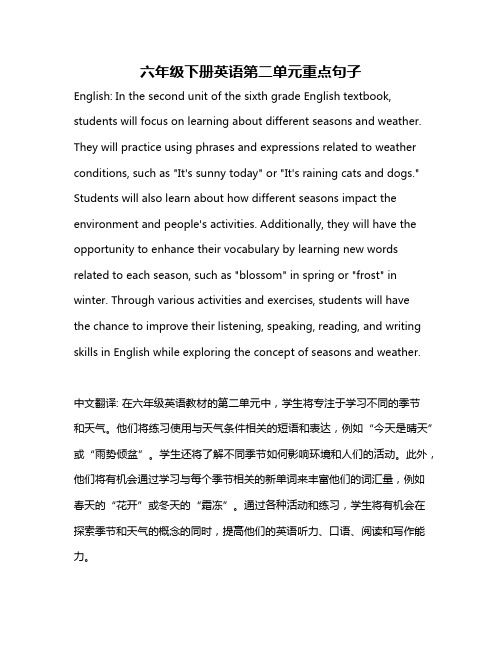
六年级下册英语第二单元重点句子English: In the second unit of the sixth grade English textbook, students will focus on learning about different seasons and weather. They will practice using phrases and expressions related to weather conditions, such as "It's sunny today" or "It's raining cats and dogs." Students will also learn about how different seasons impact the environment and people's activities. Additionally, they will have the opportunity to enhance their vocabulary by learning new words related to each season, such as "blossom" in spring or "frost" in winter. Through various activities and exercises, students will havethe chance to improve their listening, speaking, reading, and writing skills in English while exploring the concept of seasons and weather.中文翻译: 在六年级英语教材的第二单元中,学生将专注于学习不同的季节和天气。
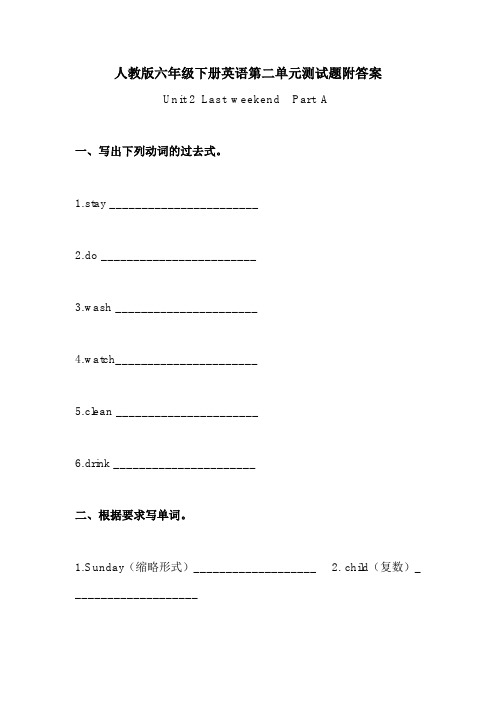
人教版六年级下册英语第二单元测试题附答案Unit 2 Last weekend Part A一、写出下列动词的过去式。
1.stay _______________________2.do ________________________3.wash ______________________4.watch______________________5.clean ______________________6.drink ______________________二、根据要求写单词。
1.Sunday(缩略形式)___________________2. child(复数)_ ___________________3.is(过去式)__________________________4.too (同音词)_ __________________5.Mike(名词所有格)___________________6.that’s(完全形式)________________7.something(同义词)___________________ 8.show(复数)_ ____________________三、看图,写出下列动词词组的原形。
四、单项选择。
()1.I stay at home ________ your father.A.toB.onC.with()2.I watch shows _________ TV.A.toB.onC.with()3.Did you do ____________else?A.somethingB.anythingC. everything()4.I stayed _____ home last weekend.A.inB.onC.at()5.--________ did you do? --I cleaned my room.A. WhatB. WhoC. Where()6.– Did you ________ your roomlast weekend?A.cleansB.cleanC. cleaned()7.–Did you wash your clothes?– No, I _________________.A.did something elseB.did anything elseC. wash my clothes五、英汉互译。


六年级下册英语第二单元知识点一、核心词汇1.动词短语类:cleaned my room 打扫房间washed my clothes洗衣服stayed at home待在家里watched TV看电视read a book读书saw a film看电影had a cold感冒2.时间短语类:last weekend上周末yesterday昨天last night昨天晚上last Monday上个星期一the day before yesterday前天二、了解词汇drank喝show演出better更好的faster更快的fixed修理broken破损的anything else其他的事情三、核心句型1.How was your weekend?你周末过得怎么样?2.—What did you do last weekend?上周末你干什么了? —I played football.我踢足球了。
解读: What did + 主语+ do + 过去时间?用来询问他人过去某一时间做了什么事情。
回答用“主语+ 动词过去式+ 其他.”。
3.—Did you read books?你读书了吗?—Yes, I did./No, I didn’t.是的,我读了。
/不,我没读。
解读: Did + 主语+ 动词原形+ 其他?用来确定他人过去某个时间是否做了某事。
回答用“Yes, 主语+ did./No, 主语+ didn’t.”。
四、了解句型I stayed at home with your grandma. 我和你奶奶待在家里。
解读: with在这里指“和……一起”。

六年级下册第二单元英语知识点一、重点单词。
1. 形容词。
- clean(干净的) - dirty(脏的)- healthy(健康的) - unhealthy(不健康的)- strong(强壮的) - weak(虚弱的)- happy(高兴的) - sad(悲伤的)2. 与生活习惯相关的名词。
- habit(习惯)- exercise(锻炼;练习)- sleep(睡觉)- junk food(垃圾食品)- vegetable(蔬菜)- fruit(水果)3. 频度副词。
- always(总是)- usually(通常)- often(经常)- sometimes(有时)- never(从不)二、重点短语。
1. 与健康生活方式相关。
- do exercise(做锻炼)- eat vegetables(吃蔬菜)- eat fruit(吃水果)- drink milk(喝牛奶)- go to bed early(早睡)- get up early(早起)- keep clean(保持干净)- wash hands(洗手)2. 表示频率的短语。
- once a day(一天一次)- twice a week(一周两次)- three times a month(一个月三次)三、重点句型。
1. 描述健康习惯。
- I often do exercise. It makes me strong.(我经常做锻炼。
它让我强壮。
)- She always eats vegetables. They are good for her health.(她总是吃蔬菜。
它们对她的健康有好处。
)2. 描述不健康习惯及影响。
- He sometimes eats junk food. It's bad for his body.(他有时吃垃圾食品。
这对他的身体有害。
)- They never go to bed early. So they are often tired in class.(他们从不早睡。
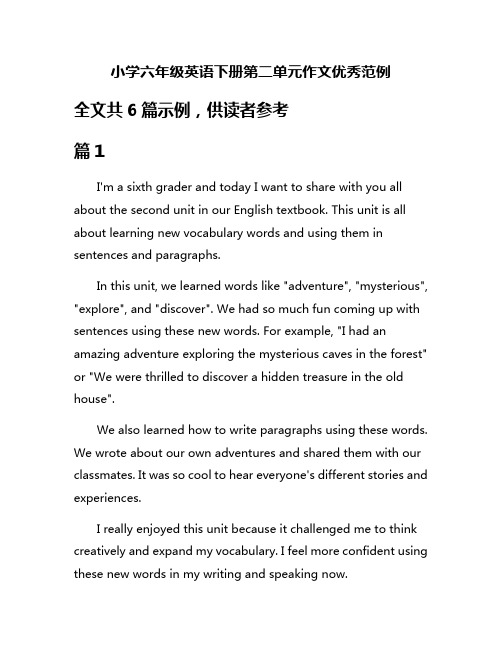
小学六年级英语下册第二单元作文优秀范例全文共6篇示例,供读者参考篇1I'm a sixth grader and today I want to share with you all about the second unit in our English textbook. This unit is all about learning new vocabulary words and using them in sentences and paragraphs.In this unit, we learned words like "adventure", "mysterious", "explore", and "discover". We had so much fun coming up with sentences using these new words. For example, "I had an amazing adventure exploring the mysterious caves in the forest" or "We were thrilled to discover a hidden treasure in the old house".We also learned how to write paragraphs using these words. We wrote about our own adventures and shared them with our classmates. It was so cool to hear everyone's different stories and experiences.I really enjoyed this unit because it challenged me to think creatively and expand my vocabulary. I feel more confident using these new words in my writing and speaking now.I can't wait to see what we will learn in the next unit. Learning English is so much fun!篇2Hello everyone! Today I want to share with you my wonderful essay about the second unit in the sixth grade English textbook. This unit is all about going on a trip.Last month, my family and I went on a trip to the beach. We woke up early in the morning, packed our bags, and drove to the beach. The weather was perfect and the sun was shining brightly. When we arrived, we couldn't wait to jump into the water and play in the sand.We spent the whole day swimming, building sandcastles, and collecting seashells. It was so much fun! We also had a picnic on the beach and enjoyed some delicious snacks. In the evening, we watched the sunset and it was so beautiful.During the trip, I practiced speaking English with my family. I asked for directions, ordered food, and talked to other people at the beach. It was a great opportunity to improve my English skills and have fun at the same time.I will never forget this trip to the beach. It was a fantastic experience and I can't wait to go on another adventure with my family. I love going on trips and exploring new places.,。
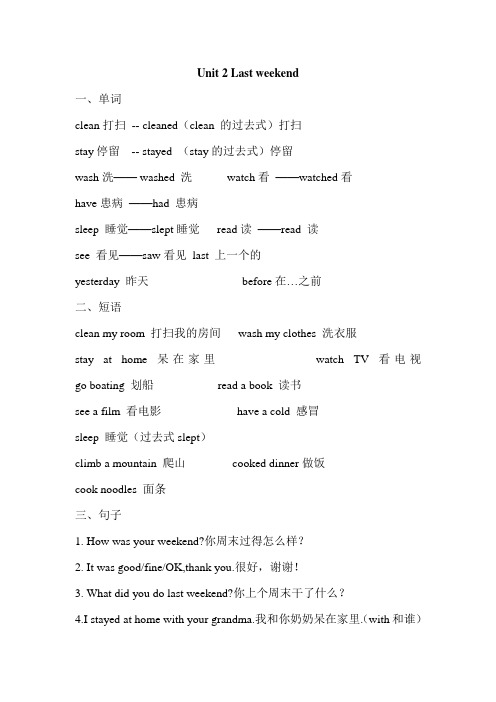
Unit 2 Last weekend一、单词clean打扫-- cleaned(clean 的过去式)打扫stay停留-- stayed (stay的过去式)停留wash洗—— washed 洗watch看——watched看have患病——had 患病sleep 睡觉——slept睡觉read读——read 读see 看见——saw看见last 上一个的yesterday 昨天before在…之前二、短语clean my room 打扫我的房间wash my clothes 洗衣服stay at home 呆在家里watch TV 看电视go boating 划船read a book 读书see a film 看电影have a cold 感冒sleep 睡觉(过去式slept)climb a mountain 爬山cooked dinner做饭cook noodles 面条三、句子1. How was your weekend?你周末过得怎么样?2. It was good/fine/OK,thank you.很好,谢谢!3. What did you do last weekend?你上个周末干了什么?4.I stayed at home with your grandma.我和你奶奶呆在家里.(with和谁)5. Did you do anything else?你还做了其他什么事吗?6. Yes,I cleaned my room and washed my clothes.是的,我扫了房间,还洗了衣服。
7.I want to buy the new film magazine.我想买期新的电影杂志。
8.Did you see a film?你看电影了吗?No,I didn’t .I had a cold. I stayed at home all weekend and slept.没有,我感冒了。
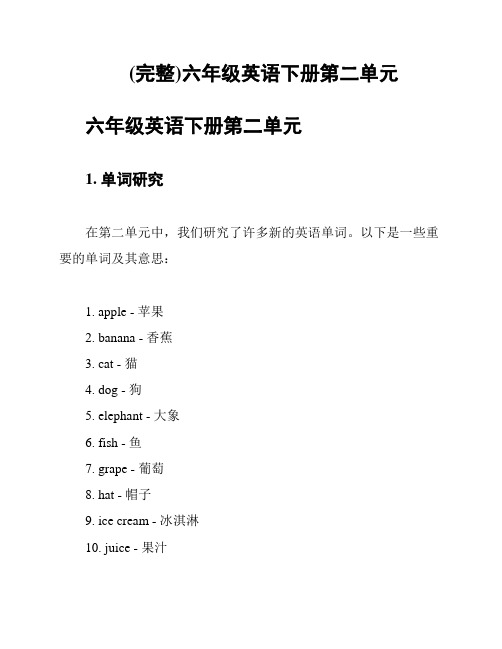
(完整)六年级英语下册第二单元六年级英语下册第二单元
1. 单词研究
在第二单元中,我们研究了许多新的英语单词。
以下是一些重要的单词及其意思:
1. apple - 苹果
2. banana - 香蕉
3. cat - 猫
4. dog - 狗
5. elephant - 大象
6. fish - 鱼
7. grape - 葡萄
8. hat - 帽子
9. ice cream - 冰淇淋
10. juice - 果汁
2. 句子练
除了研究单词,我们还练了构造简单的英语句子。
以下是一些例子:
1. I like apples. - 我喜欢苹果。
2. She has a cat. - 她有一只猫。
3. We can eat ice cream. - 我们可以吃冰淇淋。
4. They drink juice. - 他们喝果汁。
3. 对话理解
我们在这个单元中也研究了如何理解和回答简单的对话。
以下是一个例子:
A: Do you like bananas? - 你喜欢香蕉吗?
B: Yes, I do. - 是的,我喜欢。
4. 综合练
最后,我们进行了一些综合练,包括听力和阅读理解。
这些练帮助我们巩固了所学的单词和句子。
总结
第二单元是一个简单而有趣的英语研究单元。
通过研究新的单词、构造句子、理解对话和进行综合练,我们提高了英语能力并增加了对英语的兴趣。
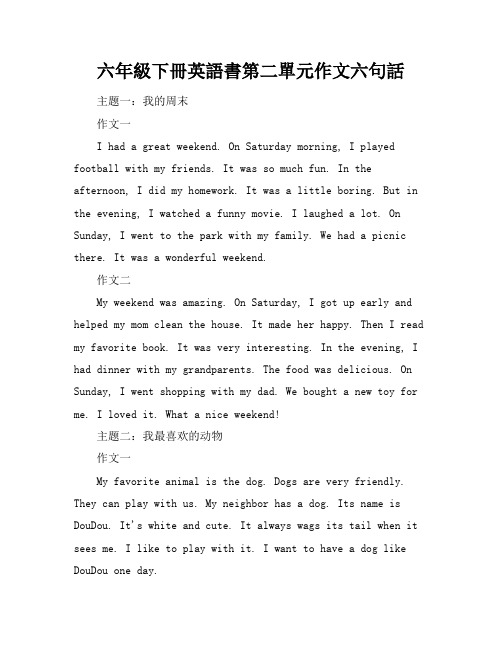
六年級下冊英語書第二單元作文六句話主题一:我的周末作文一I had a great weekend. On Saturday morning, I played football with my friends. It was so much fun. In the afternoon, I did my homework. It was a little boring. But in the evening, I watched a funny movie. I laughed a lot. On Sunday, I went to the park with my family. We had a picnic there. It was a wonderful weekend.作文二My weekend was amazing. On Saturday, I got up early and helped my mom clean the house. It made her happy. Then I read my favorite book. It was very interesting. In the evening, I had dinner with my grandparents. The food was delicious. On Sunday, I went shopping with my dad. We bought a new toy for me. I loved it. What a nice weekend!主题二:我最喜欢的动物作文一My favorite animal is the dog. Dogs are very friendly. They can play with us. My neighbor has a dog. Its name is DouDou. It's white and cute. It always wags its tail when it sees me. I like to play with it. I want to have a dog like DouDou one day.作文二I love cats very much. Cats are so lovely. They like to sleep in the sun. My friend has a cat. Its name is Mimi. It has big eyes and soft fur. It can catch mice. When I go to my friend's home, I always play with Mimi. I hope I can have a cat, too.。
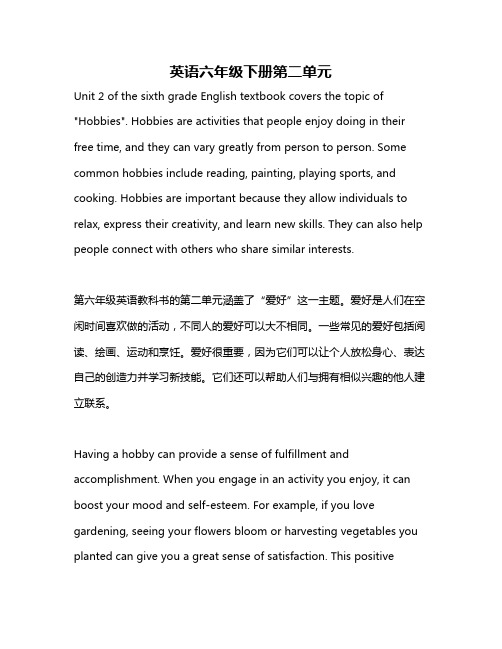
英语六年级下册第二单元Unit 2 of the sixth grade English textbook covers the topic of "Hobbies". Hobbies are activities that people enjoy doing in their free time, and they can vary greatly from person to person. Some common hobbies include reading, painting, playing sports, and cooking. Hobbies are important because they allow individuals to relax, express their creativity, and learn new skills. They can also help people connect with others who share similar interests.第六年级英语教科书的第二单元涵盖了“爱好”这一主题。
爱好是人们在空闲时间喜欢做的活动,不同人的爱好可以大不相同。
一些常见的爱好包括阅读、绘画、运动和烹饪。
爱好很重要,因为它们可以让个人放松身心、表达自己的创造力并学习新技能。
它们还可以帮助人们与拥有相似兴趣的他人建立联系。
Having a hobby can provide a sense of fulfillment and accomplishment. When you engage in an activity you enjoy, it can boost your mood and self-esteem. For example, if you love gardening, seeing your flowers bloom or harvesting vegetables you planted can give you a great sense of satisfaction. This positivefeeling can carry over into other areas of your life, making you happier and more confident overall.拥有一个爱好可以给人一种满足感和成就感。
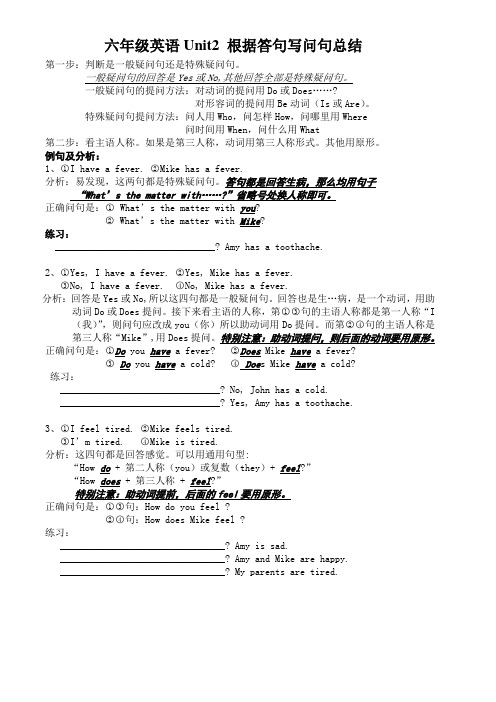
六年级英语Unit2 根据答句写问句总结第一步:判断是一般疑问句还是特殊疑问句。
一般疑问句的回答是Yes或No,其他回答全部是特殊疑问句。
一般疑问句的提问方法:对动词的提问用Do或Does……?对形容词的提问用Be动词(Is或Are)。
特殊疑问句提问方法:问人用Who,问怎样How,问哪里用Where问时间用When,问什么用What第二步:看主语人称。
如果是第三人称,动词用第三人称形式。
其他用原形。
例句及分析:1、○1I have a fever. ○2Mike has a fever.分析:易发现,这两句都是特殊疑问句。
答句都是回答生病,那么均用句子“What’s the matter with……?”省略号处换人称即可。
正确问句是:○1What’s the matter with you?○2 What’s the matter with Mike?练习:________________________________? Amy has a toothache.2、○1Yes, I have a fever. ○2Yes, Mike has a fever.○3No, I have a fever. ○4No, Mike has a fever.分析:回答是Yes或No,所以这四句都是一般疑问句。
回答也是生…病,是一个动词,用助动词Do或Does提问。
接下来看主语的人称,第○1○3句的主语人称都是第一人称“I (我)”,则问句应改成you(你)所以助动词用Do提问。
而第○2○4句的主语人称是第三人称“Mike”,用Does提问。
特别注意:助动词提问,则后面的动词要用原形。
正确问句是:○1Do you have a fever? ○2Does Mike have a fever?○3Do you have a cold? ○4 Doe s Mike have a cold?练习:________________________________? No, John has a cold.________________________________? Yes, Amy has a toothache.3、○1I feel tired. ○2Mike feels tired.○3I’m tired. ○4Mike is tired.分析:这四句都是回答感觉。

六年级下册英语第二单元作文加感受全文共6篇示例,供读者参考篇1Unit 2: A World of WondersWow, Unit 2 in our English textbook was such an amazing adventure! It took us on a journey exploring some of the most incredible wonders of the natural world. I felt like a brave explorer venturing into uncharted territories with each lesson. Let me tell you all about it!The unit started off by teaching us about the seven natural wonders of the world. I'll never forget poring over the beautiful pictures of places like the Great Barrier Reef, the breathtaking Northern Lights, and the mighty Amazon rainforest. They all looked so magical and mysterious. I couldn't believe such amazing sights existed on our planet!We learned so many fascinating facts too. Did you know the Great Pyramid of Giza is the last remaining wonder of the ancient world? Or that the Northern Lights are caused by charged particles from the sun colliding with gases in our atmosphere? Mind-blowing stuff! Reading about these natural wonders filledme with a sense of wonder and appreciation for the incredible world we live in.Next, we dove deep into exploring different habitats and ecosystems around the globe. From scorching hot deserts to freezing cold tundras, rainforests teeming with life to vast, empty stretches of the ocean depths. Each environment was more incredible than the last! We examined the unique plants and animals that have adapted to survive in these extreme conditions.I was awed by their resilience and the ingenious ways they've evolved to thrive.My favorite part was our in-depth look at coral reefs. Who knew these underwater cities were home to such a kaleidoscope of vivid colors and crazy creatures? The pictures of the clownfish darting in and out of the waving tentacles of the anemones looked like scenes from another world. I learned how the health of coral reefs is extremely important to maintaining balance in the ocean. It made me want to do my part to take care of these fragile ecosystems.Looking back, this unit wasn't just about gaining knowledge – it inspired me to appreciate the staggering beauty and diversity of our planet. From the tiniest coral polyp to the vastest desert, everything is interconnected in wonderfully complexways. I feel so lucky to live in a world jam-packed with such incredible natural wonders! This unit has motivated me to take better care of the environment and be a responsible global citizen.I can't wait to see what adventures await us in the next unit. Maybe we'll be venturing into outer space to explore themind-bending mysteries of the cosmos. One thing's for sure, learning English is proving to be an exhilarating journey ofnon-stop discoveries! Bring it on!篇2My Thoughts on Unit 2 of Our English BookThis past unit in our English book was all about discussing different countries and cultures around the world. At first, I wasn't too excited about it because I thought it would just be a bunch of facts to memorize. But it actually turned out to be really interesting learning about all the unique traditions and customs in different places!One of the first countries we learned about was India. I already knew a little bit about Indian culture from movies and TV shows, like how they wear colorful clothing and celebrate big festivals. But I didn't realize how diverse India is with so manydifferent languages, religions, and ethnic groups. It's amazing that such a huge country with over a billion people can have so much variety!We watched videos of traditional Indian dances, which looked so beautiful and intricate. The costumes were just gorgeous with all the sparkling fabrics and jewels. I loved the foot movements especially - it seems incredibly hard to move your feet that quickly! We also learned about some major Hindu festivals like Diwali, the festival of lights. Setting off fireworks and decorating with oil lamps sounds like so much fun. I told my mom we should try decorating our house with lamps for Diwali this year.Another really cool country we studied was Kenya in East Africa. I had never heard of some of the ethnic groups there like the Maasai and Samburu people. Their colorful beaded jewelry and cultural traditions of celebrating coming-of-age ceremonies sounded so fascinating. I thought it was awesome how the Maasai warriors have to go through these intense tests of bravery and endurance by things like drinking bitter drinks or being whipped! Not that I would ever want to go through that myself, but their cultures seem to value courage and strength so much.One tradition I thought was really neat from Kenya was the Maasai people's practice of drinking blood from cattle. I know it may sound gross, but they believe it gives them nutrients and connects them to their livestock, which are so important in their semi-nomadic lifestyle. Just thinking about drinking blood makes me feel squeamish, but I can understand why it's meaningful to them within their culture and beliefs.We also read about some interesting cultural traditions from countries likeJapan and Peru. In Japan, there are so many unique customs like taking off your shoes indoors, using chopsticks for meals, and special tea ceremonies. Everything seems to have an air of tranquility and respect. One thing I found really cool was the practice of forest bathing or "shinrin-yoku" where people go out and intentionally appreciate nature to reduce stress. It makes me want to go hiking and try being more mindful in the outdoors.From Peru, we learned about the ancient Incan culture and sites like Machu Picchu, which look absolutely breathtaking from the pictures and videos we saw. I had no idea the Incas were such skilled builders and engineers with all their precisely constructed cities and roads through the mountains. Their weaving was gorgeous too - I loved seeing all the vibrant colors and patternsof their textiles. We tried our hand at creating some simple woven designs in class too, which was trickier than I expected!One fun fact I remember is that the Incas didn't have a writing system but instead used sets of knotted strings called khipu to record information. That seems so bizarre to me since writing is such a fundamental part of communication nowadays. But it's clever that they developed an entire system just based on knots. Maybe I should start practicing my knot-tying skills just in case writing somehow disappears in the future!Learning about all these fascinating cultures from around the globe really made me appreciate how diverse the world is. Every society has its own unique traditions, values, art, and way of life that has developed over centuries. It makes me want to travel internationally someday to experience some of these cultures firsthand. At the very least, I'd love to try my hand at crafts like weaving, woodcarving, or indigenous dances from different places.This unit also reminded me of how fortunate I am to live in a community that values education and allows both girls and boys to attend school. Many parts of the world still lack access to quality education, especially for girls. Reading about cultural practices like the coming-of-age rituals for girls in Kenya mademe grateful that I don't have to undergo archaic tests of bravery or get married off at a young age. I can stay in school and pursue my dreams of maybe becoming a writer, artist, or scientist someday.While some of the traditions we learned about seemed quite unusual to me at first, I tried to keep an open mind and understand things from their cultural perspective. Just because some practice seems odd or even disturbing to me doesn't mean I should dismiss it entirely as wrong or backward. These customs arose for valid reasons - whether spiritual beliefs, survival tactics, social bonding, or marking major life events - and played important roles in shaping each society's values and identities over time. As my teacher emphasized, we should aim to appreciate diversity rather than judge other cultures through our own narrow lens.I'm really glad we spent so much time diving into the rich tapestry of global cultures in this unit. It opened my eyes to all the wonderful variety in human societies and how every group has intelligent traditions suited to their environment and circumstances, even if they seem eccentric at first glance. I feel like I have a broader perspective now and motivation to keep learning about the world's diverse ethnic heritages.Maybe nextwe could study some indigenous cultures from North America or Australia!At the end of the day, we all want similar things - a sense of community, meaningful traditions to mark important occasions, creative outlets for self-expression, and values to guide us. But the specific ways humans have manifested those universal yearnings through culture and practices vary immensely across the globe. That's what makes our world so fascinating and this unit so enjoyable to explore. I have a deeper appreciation now for the world's cultural mosaic, and I hope to keep an open and curious mindset as I continue my educational journey.篇3Title: My Journey Through Unit 2Oh boy, where do I even begin? Unit 2 of our English textbook this semester has been a wild ride, let me tell you! It's like a roller coaster of new words, grammar rules, and fascinating stories that have truly expanded my mind.The first thing that caught my attention was the vibrant illustrations and colorful pages. I know they say you shouldn't judge a book by its cover, but the eye-catching visuals made me eager to dive right in. And boy, was I in for a treat!The unit started off with a captivating story about a group of friends embarking on an exciting adventure. I found myself completely immersed in their world, following their every step and cheering them on as they faced challenges and overcame obstacles. It was like being a part of their journey, and it made me realize how powerful storytelling can be in helping us understand different cultures and perspectives.But it wasn't just about the stories; the unit also introduced a plethora of new vocabulary words. At first, I'll admit, I felt a bit overwhelmed. Words like "resilient," "perseverance," and "determination" seemed like a mouthful. However, our teacher had some clever tricks up her sleeve. We played word games, created mnemonics, and even acted out the meanings of these words. Before I knew it, I found myself using them in my everyday conversations, much to the amusement of my parents!Grammar was another aspect of the unit that initially made me want to pull my hair out. Tenses, clauses, and sentence structures – it felt like a maze of rules and exceptions. But our teacher broke it down into bite-sized pieces, and we practiced through engaging activities and exercises. Who knew that learning about subject-verb agreement could be so much fun?One of the highlights of the unit was the project we did on cultural traditions. We got to research different customs and celebrations from around the world, and then present our findings to the class. I learned so much about the richness and diversity of our planet, and it made me appreciate the beauty of different cultures even more.Speaking of appreciation, I have to give a shout-out to our amazing teacher, Ms. Johnson. Her patience, enthusiasm, and creative teaching methods made every lesson enjoyable and engaging. She truly has a gift for making complex concepts accessible and relatable.As I reflect on Unit 2, I can't help but feel a sense of accomplishment and pride. Not only have I expanded my English language skills, but I've also gained a deeper understanding and appreciation for the world around me. The stories, vocabulary, and cultural explorations have opened my eyes to new perspectives and ignited a curiosity within me that I never knew existed.Looking ahead, I'm excited to continue my English language journey and see where it takes me. Who knows, maybe one day I'll be writing stories of my own or exploring new cultures firsthand. For now, though, I'll cherish the memories and lessonslearned from Unit 2, and carry them with me as I embark on the next chapter of my educational adventure.篇4Unit 2 - A Taste of AdventureThis unit was all about adventure and trying new things. I have to admit, at first I wasn't too excited about it. I'm kind of a homebody and like my routine. The idea of going on adventures and stepping out of my comfort zone made me a little nervous. But as we worked through the unit, I realized that adventures don't have to be crazy dramatic events. Even small things like trying a new food or activity can be an adventure!The reading passages in this unit were really cool. We read all about famous explorers like Jacques Cousteau who explored the depths of the ocean. It was amazing to learn about how he invented new diving equipment and got to see sea creatures that no human had ever seen before up close. We also read about the first people to climb big mountains like Mount Everest. I can't even imagine how cold and difficult that must have been! Those early explorers were so brave.There were also stories about kids going on more everyday adventures, like summer camp for the first time or traveling to anew country with their family. I really related to the one about Samantha being nervous to start at a new school after her family moved. I remember how scared I was on my first day at this school a few years ago. It's hard being the new kid! But just like Samantha, I ended up making friends and now I can't imagine being anywhere else.My favorite part of the unit was definitely the food section. We learned about all sorts of fun snacks and dishes from around the world - everything from french crêpes to Israeli falafel to Brazilian brigadeiros (those chocolate balls were SO good!). Our teacher had us all bring in a dish from another country or culture and we got to try everything. There were so many new and different flavors! I'm really picky about food normally, but I was surprised by how much I liked.I think my least favorite part was probably the project we had to do on planning an imaginary adventure trip. It took a lot of research and planning to figure out an itinerary, budget for costs, etc. My partner Katie and I decided to plan a trip to Australia to see the Great Barrier Reef, the Sydney Opera House, and go on a safari in the Outback. It was fun to dream, but also kind of stressful making sure we accounted for everything! If Iever actually got to go on that trip though, I'm sure it would be incredible.One of the biggest things I learned from this unit is that every new experience is a chance for an adventure. It doesn't have to be incredibly extreme or exotic - just doing something you've never done before counts! I realized that I am a little bit of an adventurer after all. Over the past few weeks, I tried Indian food for the first time (loved the naan bread!), went to check out a new bike trail in the park nearby, and even convinced my parents to let me get my hair cut shorter which is a big change for me. Small adventures add up.I also learned that adventures often come with a little fear or anxiety at first, which is totally normal. But you'll never get to experience anything new and exciting if you don't work past that fear. The reading about the explorer Matthew Henson put it really well - he said "The journey of adventure starts with a single footstep." You just have to take that first step, even if you're feeling nervous or unsure. Then with each new step, your confidence grows.Overall, this was probably my favorite unit we've done this year. It pushed me out of my comfort zone in a good way and opened my eyes to all the adventures waiting to be had, big andsmall. I can't wait to see what new experiences and adventures middle school will bring. Bring it on!篇5Unit 2: A World of WondersEnglish class has always been one of my favorite subjects, but Unit 2 in our textbook this year was extra special. It was all about exploring the amazing wonders of the natural world around us. As a kid who loves being outdoors, I was really excited to learn more about the incredible plants, animals, and environments on our planet.The unit kicked off with a reading about the rainforests. I've seen pictures of rainforests in movies and books before, but learning all the facts and details about how diverse and important they are was mind-blowing. Did you know that rainforests are home to over half the world's plant and animal species? Or that an area of rainforest the size of a football field is cleared every second? It's crazy to think about, but also really sad. The rainforests provide so many invaluable resources and habitat that we need to protect them.My favorite part was getting to explore a virtual rainforest environment on the classroom tablets. We could wanderthrough the dense foliage, spot colorful birds and butterflies, and even hear the ambient sounds of the forest. It felt like being transported into another world. I kept wishing I could visit a real rainforest someday and experience it for myself. Hopefully by the time I'm an adult, more will be done to preserve and protect these important ecosystems.Next, we learned about the polar regions of the Arctic and Antarctic. I'll admit, at first I didn't think this part would be as interesting since it's basically just a frozen wasteland, right? Boy, was I wrong! The Arctic is teeming with cool animal life like polar bears, seals, walruses, and even species of whales and birds. And get this - the largest desert in the world is actually in Antarctica! Who knew a desert could exist somewhere that cold and icy?We watched some video clips of polar bear cubs playing and seals lounging on ice floes, and I couldn't get over how adorable they were. At the same time, it was pretty scary to learn about the dangers they face from climate change and melting ice caps. If we don't make changes to reduce our impact, many of these animals could become endangered or even go extinct. That would be such a tragic loss.I have to say though, of all the environments we studied, my personal favorite was the coral reefs. The videos and photos wesaw of those underwater wonderlands were just breathtaking. All those vibrant colors, fascinating creatures, and intricate structures made me feel like I was looking at art in a museum. It's incredible that those massive reef systems are actually built by tiny creatures called coral polyps!Our teacher brought in some coral samples for us to examine up close. Seeing the grooves and details in their calcareous skeletons gave me a whole new appreciation for how unique and complex they truly are. We also got to learn about other amazing reef residents like clownfish, sea turtles, sharks, and the itsiest-bitsiest cool creatures called sea slugs. I decided that when I grow up, I either want to be a marine biologist who studies coral reefs or an underwater photographer who captures their beauty to share with the world.While learning about these incredible natural environments was fascinating, it was also disheartening to learn about the threats they face from human activity. Things like pollution, overfishing, deforestation, and the impacts of climate change are putting them at serious risk. Our teacher had us do a class project looking at what different organizations and communities around the world are doing to help protect and preserve these ecological wonders. It was inspiring to see how people arecoming together to be environmental stewards and caretakers of our planet.For my part of the project, I created an awareness poster highlighting why coral reefs are so important and what individuals can do to help, like using reef-safe sunscreen, avoiding plastic, and supporting marine conservation efforts. My mom posted it on the fridge at home and even shared it with family members to help spread the word. Every little bit of awareness helps, right?In the end, this unit gave me such an appreciation for the rich diversity of life on Earth and the delicate balance of the ecosystems we all depend on. It made me realize how lucky I am to live in an area with access to parks, trails, and natural spaces to explore. I've decided that over summer break, I'm going to log some volunteer hours at the local nature center to do my part in caring for the environment.Most importantly though, Unit 2 instilled in me a deeper sense of responsibility when it comes to being an environmental steward. The wonders of nature that we studied aren't just amazing from a distance - they're precious resources that need our collective effort to protect and preserve for future generations. As I get older, I hope to find more ways to reducemy environmental impact through choices like conserving energy and water, eating sustainable foods, and avoiding single-use plastics.If this unit taught me anything, it's that our planet is an absolute treasure worth celebrating and safeguarding, from the peak of the highest mountain to the depths of the most vibrant coral reef. I feel so fortunate to have had the opportunity to learn about these incredible environments. Moving forward, I'll carry that appreciation and stewardship mindset with me always. Here's to many more adventures delving into the world's natural wonders!篇6Unit 2: Making FriendsI was pretty excited when we started Unit 2 in our English textbook. The theme was all about making friends and being a good friend. As a sixth grader, friends are super important to me and I was curious to learn more about it.The first few lessons covered how to introduce yourself and start conversations. We practiced simple dialogues like "Hi, my name is..." and "What's your favorite...?" At first it felt a bit cheesy doing role plays, but I realized how useful those basics are. Youcan't make friends if you don't know how to greet people and ask them questions about themselves.Then we moved on to describing personalities and interests. There were loads of new adjectives to learn like outgoing, artistic, energetic and patient. Describing my own personality was kind of hard - it's not something I really think about usually. But it helped me realize what kinds of people I tend to get along with best.My favorite part was learning about clubs and activities. The dialogues were all about inviting friends to join a club, like "Do you want to join the art club with me?" or "I'm thinking of starting a coding club, want in?" It made me wish my school had more interesting clubs. Maybe I'll start one myself after reading those examples!There were also lessons on making plans with friends and dealing with conflicts. I especially liked the tips on compromising, like taking turns choosing what to do. My friends and I argue over little things sometimes, so those were really good advice to learn.For the writing part, we had to write a short story featuring two characters becoming friends. I made mine about a new student joining my class and how someone helped make themfeel welcome. Getting to be creative while practicing the vocabulary was fun.The readings were cool too. There were narratives about friends supporting each other through tough times, as well as folk tales about the importance of friendship across cultures. It reminded me how lucky I am to have such great friends.Looking back, I didn't expect to get so much out of this unit.I figured it would be mostly basic conversational stuff. But it went deeper into the qualities that make someone a good friend and how to be there for your friends. Those are some valuable life lessons packaged into an English textbook!The activities and role plays maybe felt a tad childish at times. But they really worked for helping cement the phrases and vocabulary. I can intro myself more confidently now. And I have a better sense of what I want in a friend after describing different personality types.Friendship is one of the most essential parts of life, probably the most important for kids my age. So I'm glad we devoted a whole unit to learning about it in a thoughtful way. The games and stories made it engaging while still covering practical communication skills. It's one of those units I imagine myself looking back on years later and still finding useful!Overall, Unit 2 was extremely relevant to my current life as a sixth grader. The balance of dialogues, readings, writing assignments and activities made for a well-rounded approach to such an important topic. While some parts were a bit too elementary, it served as a great refresher on friend-making basics while exploring deeper ideas around friendship. I feel like I have a stronger grasp now on how to be a good friend and work through challenges that arise. These are skills I can take with me into middle school and beyond as I continue nurturing my friendships for years to come. Not bad for a textbook unit!。
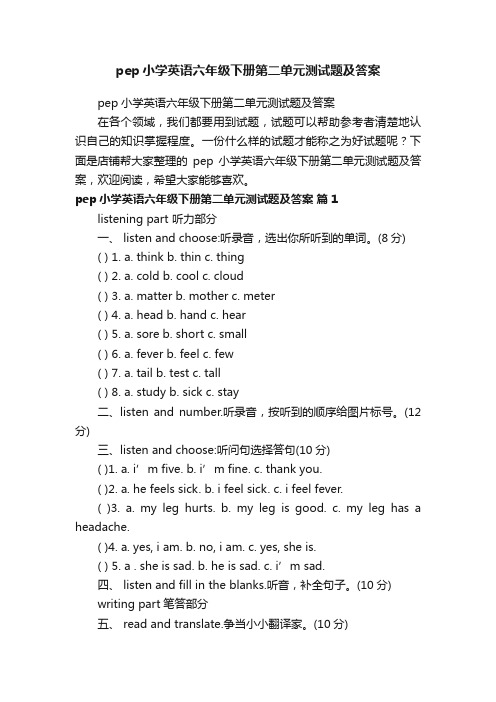
pep小学英语六年级下册第二单元测试题及答案pep小学英语六年级下册第二单元测试题及答案在各个领域,我们都要用到试题,试题可以帮助参考者清楚地认识自己的知识掌握程度。
一份什么样的试题才能称之为好试题呢?下面是店铺帮大家整理的pep小学英语六年级下册第二单元测试题及答案,欢迎阅读,希望大家能够喜欢。
pep小学英语六年级下册第二单元测试题及答案篇1listening part 听力部分一、 listen and choose:听录音,选出你所听到的单词。
(8分)( ) 1. a. think b. thin c. thing( ) 2. a. cold b. cool c. cloud( ) 3. a. matter b. mother c. meter( ) 4. a. head b. hand c. hear( ) 5. a. sore b. short c. small( ) 6. a. fever b. feel c. few( ) 7. a. tail b. test c. tall( ) 8. a. study b. sick c. stay二、listen and number.听录音,按听到的顺序给图片标号。
(12分)三、listen and choose:听问句选择答句(10分)( )1. a. i’m five. b. i’m fine. c. thank you.( )2. a. he feels sick. b. i feel sick. c. i feel fever.( )3. a. my leg hurts. b. my leg is good. c. my leg has a headache.( )4. a. yes, i am. b. no, i am. c. yes, she is.( ) 5. a . she is sad. b. he is sad. c. i’m sad.四、 listen and fill in the blanks.听音,补全句子。